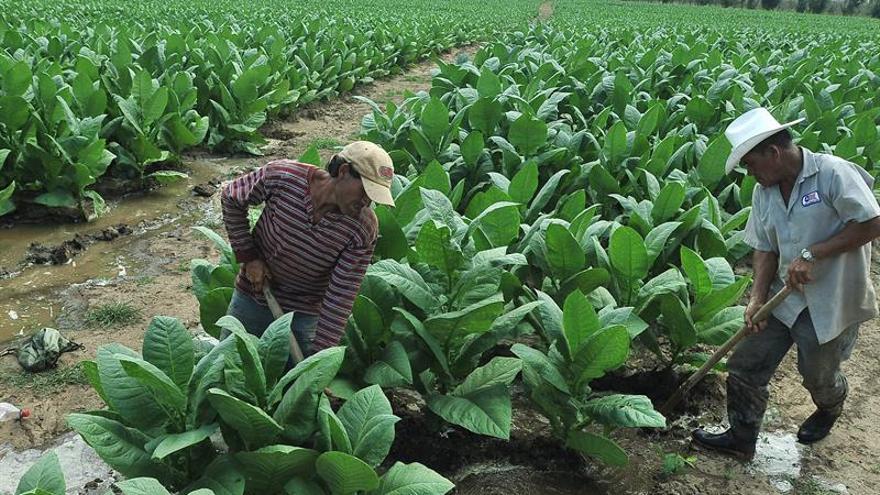
![]() 14ymedio, Havana, 10 November 2023 — At least nine tobacco farms in the municipality of Estelí, in Nicaragua, are being repaired or operating under the command of alleged Cuban businesspeople. According to a report published this Wednesday by Nicaragua Investiga, local producers and farmers fear that, with the relations between both regimes, “new and uncomfortable investors” will enjoy privileges that unbalance competition.
14ymedio, Havana, 10 November 2023 — At least nine tobacco farms in the municipality of Estelí, in Nicaragua, are being repaired or operating under the command of alleged Cuban businesspeople. According to a report published this Wednesday by Nicaragua Investiga, local producers and farmers fear that, with the relations between both regimes, “new and uncomfortable investors” will enjoy privileges that unbalance competition.
The most widespread suspicion among the Estelí cigar growers, according to the press, is that these Cuban businesspeople who have recently arrived in Nicaragua have come as “front men.”
“After 30 or 40 years in this market, we all know each other, none of these new investors is someone with a known name, if anything they are workers in Cuban tobacco companies, they are people who only lend their names, there is the country’s capital there, people from that Government,” one of the workers told Nicaragua Investiga on condition of anonymity.
The guajiros, tobacco farmers, are sure that the Cuban investors — some associated with Cubatabaco, the company that controls the sector on the Island – arrived “hand in hand” with the Government of Daniel Ortega, and have been situating themselves in farms purchased from other businesspeople or that were abandoned after having been interfered with by the State.
The Guajiros are sure that the Cuban investors, some associated with Cubatabaco, arrived “hand in hand” with the Government of Daniel Ortega
“This property belonged to people who were prosecuted for alleged links with organized crime and investigated by the State, and afterwards they were found guilty and sentenced to several years in prison. Now some people appear, supposedly Cuban businesspeople, investing in [the property]” said one of the interviewees about a farm that years ago belonged to some Guatemalans.
According to what he says, the farm is located near the Estelí School of Agriculture and Livestock, also known as the Catholic University of the Dry Tropics, which was also confiscated this year by the State in its offensive against the Catholic Church.
The farmers have seen multi-story facilities built on the land for the processing of cigars and work has been carried out on the land for the cultivation of the leaf. They are also looking for employees and say they came with ideas to help the community. “Some neighbors have been asked what the community’s needs are,” say the cigar growers.
Another of the farms where the Cubans have been seen is located on the side of the Pan-American Highway and, they explain, the owners abandoned it because the soil was contaminated by volcanic matter. “The material was extracted, such as stones that were used for asphalt, and now the new owners are cleaning it to rehabilitate the farm,” said a resident of the area, located several kilometers from Estelí.
In the last decade, the Nicaraguan cigar has become popular in the international market, sharing with Cuba favorite buyers such as China and other European countries, in addition to having the advantage of trading with the United States, where the sale of Cuban tobacco is prohibited under the embargo. “That explains these movements,” said a producer convinced that Cuba has been pursuing these opportunities.
In Estelí, they emphasize, they are building “large complexes and modern factories” that they cannot have on the Island. “We know that in Cuba there are serious problems in sustaining this sector due to constant energy failures and high production costs, and the blockade that the country suffers,” they argue.
The farmers and businesspeople cited by Nicaragua Investiga are not so much concerned about the appearance of the investors as the impact of their relations with the Ortega regime, which may end up favoring newcomers and disrupting “healthy competition.” “Unfair competition would cause annoyance,” they say.
Another fear of the tobacco growers is that the Government will decide, in order to establish a monopoly in the sector controlled by four hands with the Island, to confiscate businesses and properties, a strategy in which it already has a long history.
“We know that in Nicaragua there is no legal security with properties. There are companies that have been in this industry for years and have invested in their facilities, there is truly a lot at stake. At the slightest bad sign, these companies could leave the country and the ‘the loss is to the people because the jobs are lost’,” they lament.
According to data from Nicaragua Investiga, since 2018 Ortega has closed 3,500 NGOs, appropriating all their assets. “The seizures of the assets of the newspaper La Prensa, the Central American Institute of Business Administration (Incae) and the Fundación del Río alone was a theft amounting to 51.5 million dollars,” the platform highlights.
The Central American University, also investigated, had more than half a dozen scientific facilities and several square kilometers of land confiscated. Another 316 properties have been seized from political prisoners, lawyers, journalists and other professionals, and important institutions such as the Nicaraguan Academy of Language have been closed.
____________
COLLABORATE WITH OUR WORK: The 14ymedio team is committed to practicing serious journalism that reflects Cuba’s reality in all its depth. Thank you for joining us on this long journey. We invite you to continue supporting us by becoming a member of 14ymedio now. Together we can continue transforming journalism in Cuba.
